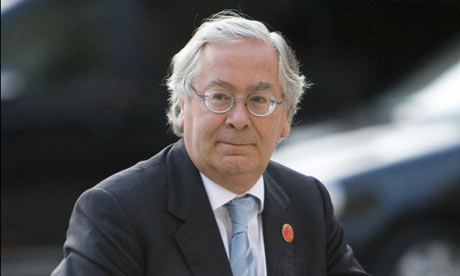Bank of England reveals £61.1bn spent propping up RBS and HBOS
Mervyn King tells Treasury select committee of emergency loans issued at the height of the financial crisis
Royal Bank of Scotland and HBOS were secretly handed a £62bn lifeline by the government to prevent them from collapsing last October, the Bank of England governor Mervyn King revealed , prompting a sharp "intake of breath" among MPs.
The figure had been known to only a handful of people until today when the authorities concluded that the banking system had stabilised enough to admit the scale of the intervention that was needed to prop up the banks in the days after Lehman filed for bankruptcy.

Mervyn King detailed the Bank of England's 'extraordinary' responses to the financial crisis. Photograph: Chris Ratcliffe/Reuters
The revelation before the Treasury select committee of MPs prompted a furious reaction from the Liberal Democrat treasury spokesman, Vince Cable, who intends to table a question to demand the chancellor explain the circumstances surrounding the emergency lending.
John McFall MP, chairman of the committee, admitted that there was an "intake of breath" among his colleagues over the figure, thinking about "how many universities, how many colleges, how many jobs could you support with this".
There was also confusion in the City about why the banks had not been forced to disclose their reliance on the Bank of England in documentation issued to shareholders last October when they were embarking on emergency rights issues. But both banks insisted they had made sufficient general statements about central bank funding at the time.
As King spoke of the dramatic events of the past year and the "extraordinary" responses required from the Bank in its role as "lender of the last resort", the new parent company of HBOS was asking investors to support a record-breaking £13.5bn cash call.
Lloyds is planning to issue 36bn new shares at 37p each to try to bolster its balance sheet weakened by its rescue takeover of HBOS during the financial crisis. The taxpayer is being asked to spend another £5.8bn to buy the shares.
The 2.8m private investors in Lloyds will this weekend begin to receive documents asking them to spend, on average, an extra £366 to back the rights issue.
HBOS was receiving secret government support last year even though it had agreed to be taken over by Lloyds.
King caused surprise when he told the committee: "I have sent a letter to you to explain more fully one aspect of the Bank's operations that was prompted by those events: lending facilities that we put in place at the height of the crisis for two individual institutions that we are now able to disclose."
Alistair Darling, who also wrote a letter to the committee, said that the figure was kept a secret because knowledge of its existence could "jeopardise the financial stability of the system as a whole".
King said that the loans to HBOS and RBS, which were extended in October 2008, were fully repaid – one in December 2008 and the other in January 2009.
The two banks put up collateral worth more than £100bn in return for the loans as the financial system was rocked by the failure of US investment bank, Lehman Brothers.
The combined borrowings of both banks – which were charged a fee for the facilities – peaked on 17 October last year, the Bank said. The fee was 1.7 percentage points above the usual lending rate.
The Bank said use of the emergency facilities peaked at £36.6bn for RBS, on 17 October 2008, and at £25.4bn for HBOS, on 13 December 2008. RBS repaid the cash by 16 December 2008, and HBOS by 16 January 2009. The collateral provided by the two banks included residential mortgages, personal and commercial loans and UK government debt with a total value in excess of £100bn.
King reiterated his belief that no bank should be too big to fail and also used the opportunity to wade into the row over how to deal with Britain's huge budget deficit, which erupted this week between Gordon Brown and Conservative leader David Cameron. Brown said that turning off the life support measures, implemented in the midst of the financial crisis, too soon could damage any hopes of recovery, but Cameron said the deficit needed to be dealt with much sooner.
King called on whichever party wins the general election to make an aggressive plan to eliminate the structural deficit over the next five-year parliamentary term. He said the proposals should set out different measures depending on the strength of the economic recovery.
King gave a gloomy assessment on the ability of the UK to return to pre-recession levels of gross domestic product.
He said figures from the International Monetary Fund and those underpinning the Bank's inflation report suggest that from pre-recession levels between 5% and 10% of Britain's entire economic output – about £100bn – will be be lost for the "indefinite future".

No comments:
Post a Comment